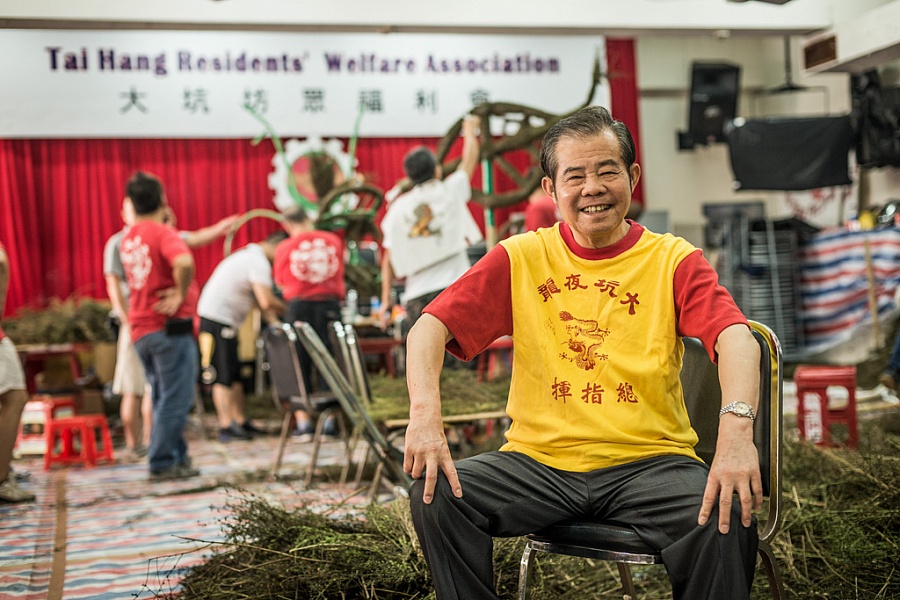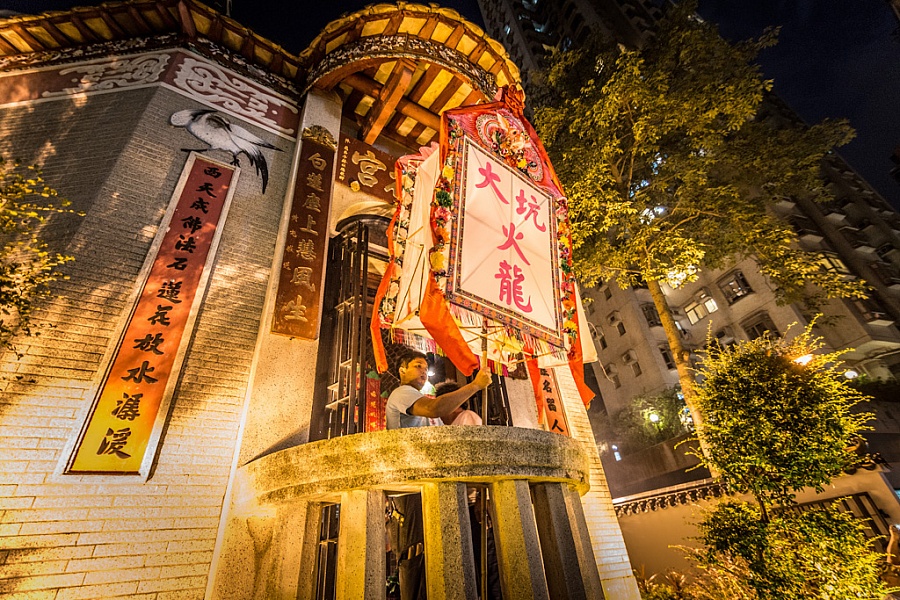First featured on Urban Diary in 2013.
The idea of a group of people in bustling urban Hong Kong having a respected community leader they turn to in resolving disputes – with even the police going to him for assistance- is almost the stuff of fairytales. But that’s exactly what the residents of the Hong Kong Island community of Tai Hang have. The community leader is Chan Tak-fai and he is also guardian of the community’s most treasured tradition as commander-in chief of the famed Fire Dragon dance.

My acquaintance with Fai Gor (Brother Fai as Chan is popularly known) made me realise that a tradition supposed to have faded into history is still enthusiastically practised in Hong Kong.
If this intimate community relationship sounds unusual for a neighbourhood that is now best known for its mix of trendy cafes, popular Japanese restaurants and down-to-earth eateries serving authentic Hong Kong fare just behind Causeway Bay, it survives because Tai Hang, formerly known as Tai Hang Village, has a long history.
Chan, 67, is a Tai Hang native. The only time he has not lived there was when, as a member of the British colonial garrison, he resided in the military camp in Sham Shui Po. He earned the residents’ respect through his services to the community, chief among these being his 40-year tenure as chief of the Fire Dragon ceremony, performed every Mid-Autumn Festival. This service means he remembers every face in Tai Hang.
The more I get to know Fai Gor, the more I like him. He has a strong sense of righteousness; fun at heart but never an easy person. He gets grumpy when seeing people being rude to waiters and waitresses, or when the topic turns to Hong Kong’s governance. He is very picky about food, and when eating out must take a number of walks around the restaurant because he lacks the patience to sit through an entire meal.

Tai Hang was named after two big water channels that used to run through the village to Victoria Harbour. Bounded by Tung Lo Wan Road to the north and Tai Hang Road to the south, the village lay on the seafront for generations until reclamation in the 1950s for the development of Victoria Park pushed the shore away. A neglected community in the 19th century, the multi-clan Hakka village lacks historical records, even a genealogy.
Fai Gor said that in the old days, the male villagers relied on quarry work to earn a living while the women did laundry – the reason that Tai Hang’s main street is called Wun Sha (washing clothes) Street. But not even Fai Gor or his buddies were able to say when their ancestors first settled in the valley.
With the kind assistance of local historian Tim Ko, I found a note in the 1970 Journal of the Royal Asiatic Society Hong Kong Branch which shed light on the origins of the village. According to James Hayes, the scholar and former colonial official who wrote the note, Tai Hang Village was one of the oldest villages on Hong Kong Island. Hayes believed the earliest settlers probably arrived in the area around the same time as the British takeover of Hong Kong in 1841. The villagers farmed, fished and kept some of Hong Kong’s earliest dairy farms.
Fai Gor joined the Fire Dragon team when he was only six, as one of the boys hoisting the cloud lanterns to light up the sky for the dancing dragon. At the age of 12, he became a dragon dancer. “We are Tai Hang boys. Being a dragon dancer was the most natural thing for each and every one of us. It wasn’t about glory. We didn’t even think about terms like glory or vanity. It was face-losing if you weren’t participating.”

Tai Hang boy is what Tai Hang natives call themselves, regardless of gender and age.
Since he assumed the most important position in the annual Fire Dragon dance in the 1970s, Fai Gor has relaxed some old rules and introduced new elements to keep the century-old tradition in line with the expectations of contemporary society. For instance, all elders of the community go to pray at the Louts Temple before the start of the dance and the ceremony was, for more than a century, a men-and-Hakka-language-only event. Fai Gor found these two rules impracticable. He abolished them to allow women into the ceremony, which now also benefits from Cantonese interpretation. But the community leader has no plan to relax the rule that prohibits women from becoming dragon dancers.
The Fire Dragon procession started in the 1880s and is today a key part of the city’s Mid-Autumn Festival celebrations. In 2011, it joined China’s third national intangible cultural heritage list.
Fai Gor has no idea if Tai Hang’s extraordinary football history had something to do with this natural progression into the ranks of the Fire Dragon dance for the local boys. For unknown reasons, this Hakka village was once home to many of China’s football stars in the 1930s and 40s. Nine of the 11 footballers representing China at the 1936 Berlin Olympics, including the team’s captain, were Tai Hang villagers. In other words, the Tai Hang football team was effectively the team for the whole nation.
Although Tai Hang was poor and unimportant in the early colonial days, thanks to its excellent location it has gone through a reversal of fortune in recent decades. But the surge in fame and importance also brings the inevitable redevelopment. It’s now much harder to maintain local contributions to the Fire Dragon cause which have sustained it over the years.
Redevelopment means that many of the old six-storey walk-up buildings have given way to gated residential blocks.
“In the past, we went straight to people’s homes, knocked on their doors and told them that it’s time to donate to the Fire Dragon. Now many of the new buildings don’t give us access, though some are kind enough to let us leave a donation box in their lobby,” Fai Gor said. In recent years, the dance has been able to continue only with the help of donations from the Hong Kong Jockey Club.
Redevelopment has also brought up the question of who now qualifies as a dragon dancer. The background of the dancers has changed over the years. When Fai Gor was young and Tai Hang was still a sleepy village, only native villagers were allowed to dance. Gradually, the rule was relaxed to include all residents as outsiders moved in.

This change came in the 1960s when traditional one-storey village houses were pulled down and replaced with six-storey tenement buildings. It was the first wave of redevelopment in which developers would combine the land previously occupied by three village houses for every one of these new blocks. This was how Fai Gor left his parents’ village house and moved into an apartment.
In recent years, the once-quiet grid of streets has undergone another round of urban redevelopment. Tai Hang boys now live in different parts of Hong Kong, from Tin Shui Wai to Tsueng Kwan O, and from North Point to Sha Tin. They have moved to other parts of Hong Kong because their old homes had to make way for redevelopment. Even Fai Gor’s younger brothers no longer live in Tai Hang.
Fai Gor knows the compensation each family receives from real estate developers who have bought out their homes. He knows very well the average amount is not going to buy him another apartment in Tai Hang.
Constantly confronting problems created by redevelopment, Fai Gor is particularly annoyed with the government’s decision to lower the threshold for compulsory sales in 2010. The decision was made to facilitate private redevelopment. The highly controversial amendment allows anyone who owns 80 per cent of the property rights of any building aged 50 years or above to put the entire block to auction. He hates this because he sees how his buddies suffer under the law. “People are forced to move out, they can’t fight the developers. Many are elderly people, they’re Tai Hang native, and they suffer from depression after moving out and die very quickly.”
After holding the Fire Dragon mantle for more than 40 years, the 67-year-old he has naturally been thinking about who can assume his role. “The person has to be young, know the Fire Dragon inside-out, command the respect of the community be a Hakka and speak the Hakka language. It will be great if he lives in Tai Hang.” He is confident he will find this person.
Q: What do you like most about Hong Kong?
A: Our annual Fire Dragon dance. We are more excited about celebrating the Fire Dragon than Lunar New Year. We are happy that we can preserve our tradition.
Q: What do you dislike most about Hong Kong?
A: 1997. We were promised that our way of life would remain the same for 50 years. But everything changed shortly after the handover. Because of the decision to outsource public services, the quality of our living has deteriorated since 1997. Outsourcing cuts salaries and affects the services we receive. The practice badly hurts our quality of living.
Q: What does Hong Kong have to do to be sustainable?
A: Build more hospitals and schools for the people, and improve welfare for the elderly.
The above is one of the stories featured in Urban Diary, a project showcasing the quiet yet extraordinary lives of 18 regular men and women in Hong Kong. Read more about the project and Chloe’s new book at urbandiarist.com/en/.
